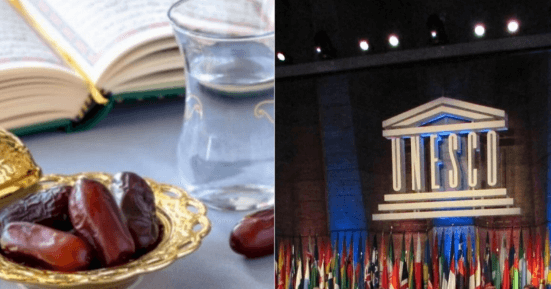UNESCO Recognizes Iftar as Cultural Heritage.
Iftar: A UNESCO-Recognized Feast for Faith, Family, and Food
The evening meal that marks the end of daily Ramadan fasting, iftar, has been officially recognized by UNESCO as an Intangible Cultural Heritage.
This prestigious designation elevates iftar beyond a meal, acknowledging its unifying power across cultures and its significance as a cornerstone of Muslim communities worldwide.
Read More: SECP Working on Strategic Action Plan for Development of Islamic Finance
A Shared Feast:
Iftar’s inscription on the list resulted from a joint effort by Iran, Türkiye, Azerbaijan, and Uzbekistan, highlighting its unifying influence across diverse Muslim cultures. This collaborative effort underscores the shared importance and cultural significance of iftar, showcasing its ability to transcend borders and connect Muslims worldwide.
More than a Bite:
Iftar is more than simply a culinary experience. It marks the culmination of a day devoted to spiritual growth and self-reflection. As the sun sets and the call to prayer rings out, families and communities gather to break their fasts together. This shared meal is a sacred moment for strengthening bonds through laughter, conversation, and shared faith.
A Global Culinary Tapestry:
While the core ritual of iftar remains constant, its culinary landscape unfolds like a vibrant tapestry. Each region boasts unique dishes and pastries, reflecting its cultural heritage and enriching the global iftar experience. From sweet treats like dates and baklava to savory delights like samosas and kebabs, this culinary diversity offers a journey for the senses, showcasing the richness of Muslim traditions.
Preserving the Legacy:
Iftar traditions are carefully preserved and passed down through generations, ensuring the continuity of this cultural treasure. Children actively participate in preparing meals and learning recipes, forging a connection to their heritage and fostering a sense of identity. This intergenerational transmission ensures that the spirit and traditions of iftar remain vibrant and continue to be celebrated for years to come.
Long-Awaited Recognition:
UNESCO’s recognition of iftar is a long-awaited validation of its profound significance in Muslim communities worldwide. It underscores the deep cultural and social importance of this time-honored tradition, acknowledging its unifying power and its ability to strengthen communities. This recognition marks a significant milestone for the Muslim community and serves as a testament to the enduring legacy of iftar.
A Beacon of Unity and Diversity:
Iftar transcends the boundaries of faith, acting as a powerful symbol of unity and diversity. It brings together people from all walks of life, fostering understanding and respect for different cultures and traditions. This shared experience strengthens the bonds of community and reminds us of our shared humanity.
Celebrating a Global Feast:
In our increasingly interconnected world, UNESCO’s recognition provides an opportunity to celebrate this remarkable cultural heritage and appreciate its universal appeal. Iftar, with its shared meals, laughter, and diverse culinary delights, serves as a global feast for the senses and the soul, uniting us through faith, family, and food. This recognition serves as a reminder of the power of traditions to bring people together and celebrate our shared humanity, regardless of cultural differences.
Note: The information above might not be accepted 100%. Please verify from your own sources. We will not be responsible for any kind of loss due to our content.
For more news, please visit Munafa Marketing.




